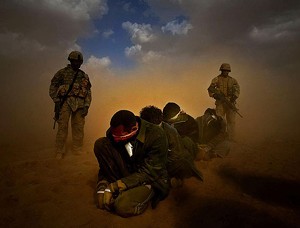Published April 9, 2008 at 5:55 a.m.
If you think you hold current and former high-ranking Bush administration weasels such as Dick Cheney, Donald Rumsfeld, John Yoo and Alberto Gonzales in low esteem right now, just wait until you've learned the role they played in institutionalizing torture since 9/11. When you buy your ticket for Taxi to the Dark Side, you may think them liars and bumblers, but you're likely to leave the Cineplex with little doubt that they're also war criminals.
This is the second essential documentary on the subject of our nation's recent misadventures in the Middle East with which filmmaker Alex Gibney has been associated. In addition to directing the 2005 jaw-dropper Enron: The Smartest Guys in the Room, he executive-produced last year's Oscar-nominated No End in Sight. Taxi, which won the Academy Award for Best Documentary, can be readily viewed as a companion piece to that milestone work.
No End chronicled the arrogance and foolhardiness behind the scenes at the White House, which resulted in many of the most devastating missteps in the administration's conduct of the Iraq war. For its part, Taxi lays out in meticulous detail the conspiracy of leaders at the highest level of government to circumvent detainee treatment protocols in both U.S. constitutional and military law, as well as in international agreements such as the Geneva Convention.
Gibney frames his film with an account of the fate that befell a 22-year-old Afghan cab driver by the name of Dilawar. In December 2002, he was taken into custody by U.S. forces after being fingered by a paid informant as the Taliban terrorist behind a rocket attack. Dilawar was transported to the American interrogation center at Bagram Air Base and beaten so mercilessly that five days later he was dead. He had not been charged with any crime. The man who accused him, it turned out, was himself responsible for the rocket attack.
While the story of this one man's unspeakable treatment is an informative study in itself, the director uses the case as a window into a far broader horror. Gibney interviews the New York Times reporters who uncovered the murder, a fellow Bagram prisoner, FBI personnel, various Pentagon officials, former General Counsel of the Navy Alberto Mora, members of Dilawar's family and the very servicemen who interrogated him. In so doing, he charts the "global migration" of illegal torture techniques from Bagram in 2002 to Abu Ghraib and ultimately to Guantanamo Bay.
That progression began with the vice president, who, on September 16, 2001, famously informed Tim Russert of "Meet the Press" that, "We have to work the dark side, spend time in the shadows, use any means at our disposal." Then there was Secretary of Defense Rumsfeld, who publicly dismissed the atrocities at Abu Ghraib as the work of "a few bad apples" while privately signing off on even harsher techniques for breaking down detainees, both physically and psychologically. Next came the lackeys in high places, such as former Attorney General Alberto Gonzales and John Yoo, formerly of the Office of Legal Counsel, who earned their keep by finding loopholes and playing word games.
At the bottom of the chain of command, on the ground, were the young military men and women who found themselves pressured to extract valuable intelligence from prisoners with little or no training and even less in the way of clear, written guidelines. The lack of printed protocols, the film argues, was no accident. The higher-ups didn't want orders authorizing degrading and inhumane treatment someday to be traced back to them.
Taxi is required viewing for anyone interested in the truth behind the controversies about detainee treatment and the use of techniques such as waterboarding. As you'd expect from a film on this subject, it's difficult to watch at times. Many images and most of the revelations are profoundly disturbing. I was shocked, for example, to learn that prisoners who've never been charged with a crime are routinely treated so savagely that many have committed suicide. I was shocked that so many detainee deaths — like Dilawar's — have been classified as homicides by military coroners. I was shocked that women have played a role in these atrocities at every level. Sgt. Selena Salcedo was one of the interrogators responsible for Dilawar's death. Captain Carolyn Wood was in charge at Bagram and later at Abu Ghraib. Then, of course, there's the sad, sick case of Lynndie England.
Perhaps most shocking is the film's revelation that fewer than 10 percent of the detainees at Guantanamo were actually captured by coalition forces. How'd the other 90 percent-plus wind up there? They were turned in by locals — some of whom had personal axes to grind, and many of whom were paid thousands of dollars per prisoner by the U.S. Gibney raises questions about why, to date, none of the detainees at Gitmo have been allowed an opportunity to answer the implied charges against them. (They have been systematically denied all habeas corpus rights and the sort of hearings guaranteed by the Geneva Convention.) The administration claims the authority to hold them indefinitely. By the time the closing credits roll, the answer seems clear: If the prisoners ever do get out, so will the full truth about what they endured there.
Taxi to the Dark Side
- Running Time: 106 min
- Rated: R
- Theater: Roxy
More By This Author
Speaking of...
-

Next Month Brings the Final Curtain for Palace 9 Cinemas
Oct 27, 2023 -

Book Review: 'Save Me a Seat! A Life With Movies,' Rick Winston
Aug 30, 2023 -

Steve MacQueen Named Executive Director of Vermont International Film Festival
May 22, 2023 -

Vermonters Are Going Back to the Movies — Under the Stars
Aug 26, 2020 -

A Powerful HBO Doc Explores What Happened 'In the Shadow of the Towers: Stuyvesant High on 9/11'
Sep 11, 2019 - More »
Comments
Comments are closed.
From 2014-2020, Seven Days allowed readers to comment on all stories posted on our website. While we've appreciated the suggestions and insights, right now Seven Days is prioritizing our core mission — producing high-quality, responsible local journalism — over moderating online debates between readers.
To criticize, correct or praise our reporting, please send us a letter to the editor or send us a tip. We’ll check it out and report the results.
Online comments may return when we have better tech tools for managing them. Thanks for reading.















































